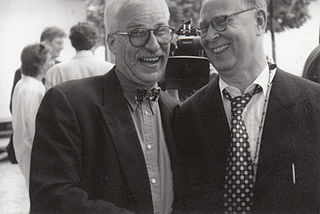A Quote by Quentin S. Crisp
The research reading I did for Fascination and Liberation included some Jung, and I noticed that he had a similar impression of Buddhism to myself, that, if it weren't for certain qualifying clauses, the philosophy would be downright suicidal.
Related Quotes
I had motives for not wanting the world to have meaning; consequently assumed that it had none, and was able without any difficulty to find satisfying reasons for this assumption ... For myself, as no doubt, for most of my contemporaries, the philosophy of meaninglessness was essentially an instrument of liberation. The liberation we desired was simultaneous liberation from a certain political and economic system, and liberation from a certain system of morality. We objected to the morality because it interfered with our sexual freedom.
For myself, as, no doubt, for most of my contemporaries, the philosophy of meaninglessness was essentially an instrument of liberation. The liberation we desired was simultaneously liberation from a certain political and economic system and liberation from a certain system of morality. We objected to the morality because it interfered with our sexual freedom.
In the case of Anathem, most of the research had to do with philosophy and metaphysics. Reading this sort of thing has never been my strong suit, so I actually had to be somewhat more "organized and results-driven" than is my habit. I just made up my mind that I was going to have to read some of these philosophy tomes, and I forced myself to read something like 10 pages a day until I had bashed my way through them.
I like as much time as I can get and I'll do whatever I think is helpful to prepare for a role. Sometimes it's practical research, meaning if I had to write shorthand, I'd learn how to write shorthand. Or if I have to know how to dance a certain way, I would learn that. And then there's just research of talking to people similar to the characters I'm playing. And there's stuff that I just feel is inspiring, whether it be music or a painting or a photograph. I've used a lot of Nan Goldin's photos in the past to inspire me. I use certain paintings and pieces of music.
I began researching and writing what I intended as a book-length essay entitled Fascination and Liberation, exploring the question of whether there is a conflict between creativity and the Eastern form of enlightenment. I don't know if I'll ever finish that essay, because I had an experience, after I'd written two or three chapters, in which it seemed to me that my psychic antibodies decisively rejected Buddhism. Interestingly, the rejection felt as if it happened in Zen terms.
Descartes, the father of modern philosophy ... would never-so he assures us-have been led to construct his philosophy if he had had only one teacher, for then he would have believed what he had been told; but, finding that his professors disagreed with each other, he was forced to conclude that no existing doctrine was certain.
Christianity persecuted, tortured, and burned. Like a hound it tracked the very scent of heresy. It kindled wars, and nursed furious hatreds and ambitions. It sanctified, quite like Mohammedism, extermination and tyranny. All this would have been impossible if, like Buddhism, it had looked only for peace and the liberation of souls. It looked beyond; it dreamt of infinite blisses and crowns it should be crowned with before an electrified universe and an applauding God... Buddhism had tried to quiet a sick world with anesthetics; Christianity sought to purge it with fire.
I was downright obnoxious. In second grade, we had some program where we kept a public list of all the books we read. I think it even included the number of pages. In my nerdy mind, having the longest and most impressive list was somehow going to make up for the fact that I couldn't climb a rope or do a backwards summersault in PE.
Failing at something is one thing, but Buddhism tells us that it is up to us how we interpret that failure [Buddhism] a philosophy and way of life that resonates with me I identify with it. I agree with so much of the sentiment behind it. I enjoy the liberating effect it's had on me to get back into the game Buddhism, with its concepts of karma and rebirth, have freed me from the twin fears of death and life without rugby, like life, will also come to an end.





























